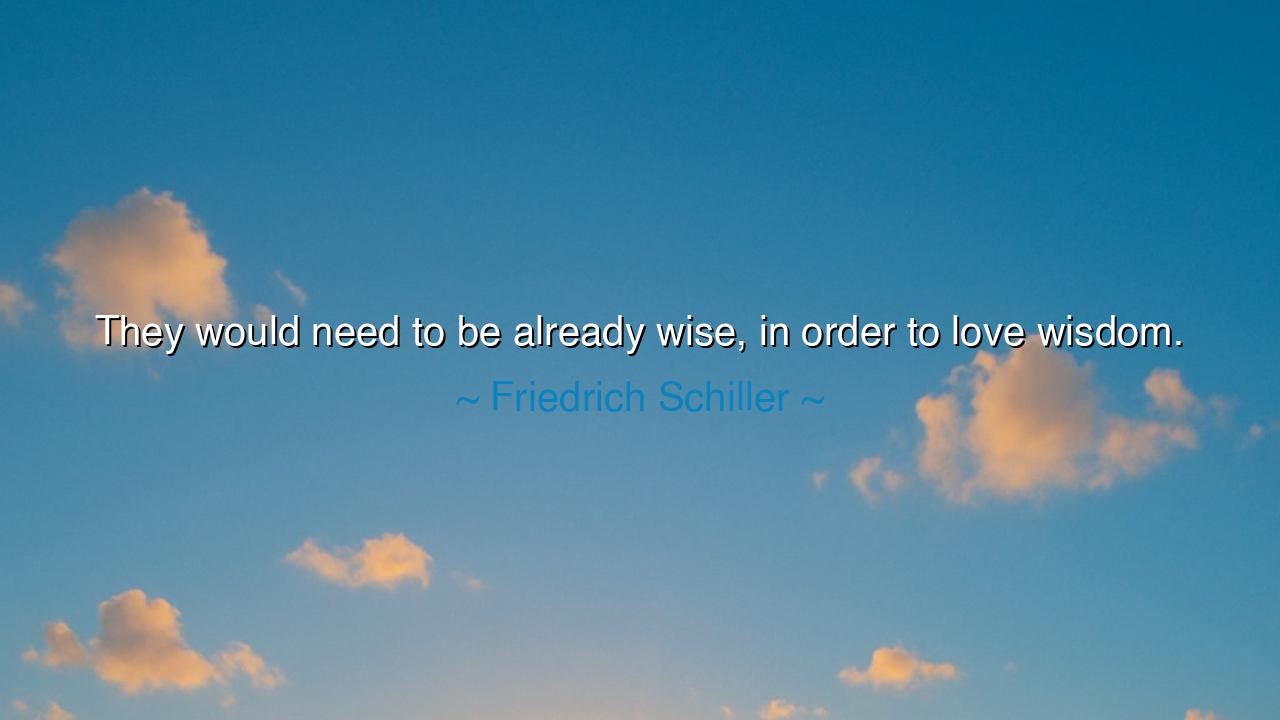
They would need to be already wise, in order to love wisdom.






Friedrich Schiller, the poet of revolution and reflection, speaks with timeless clarity: “They would need to be already wise, in order to love wisdom.” In this declaration, Schiller unravels a deep truth about wisdom and its seekers: that true love of wisdom, the kind that transcends mere knowledge, comes only when the soul is prepared, when the heart is attuned to the deeper calls of understanding. Wisdom is not a thing one chases casually, but a light that finds its way to those whose hearts are already inclined toward it, those who seek truth not for the world’s rewards, but for the sheer joy of knowing.
The meaning of Schiller’s words lies in their recognition of a certain readiness required to truly embrace wisdom. To love wisdom is not simply to admire it from afar, but to engage with it deeply, to become shaped by it. Yet how can one love that which one does not yet understand? It is only when the soul has tasted the bitterness of ignorance and yearns for something greater that it can begin to appreciate the sweetness of wisdom. Just as the seed must first break open to bloom, so too must the heart be prepared to receive the fullness of wisdom.
Consider the life of Socrates, who claimed that he knew nothing, yet he possessed a profound love for wisdom. His philosophy was not one of mere knowledge, but of questioning and seeking, recognizing that true wisdom lies not in answers, but in the awareness of how much one does not know. Socrates’ life was a testament to Schiller’s insight: to love wisdom is not merely to admire it, but to engage with it humbly, and that requires a heart already inclined toward truth, no matter the cost.
Schiller’s observation also speaks to the pursuit of knowledge in our own time. How many seek wisdom as a tool for personal gain, not understanding that wisdom itself is a way of living, a commitment to deepening one’s understanding of the world and of oneself? Like the ancient philosophers, we must learn to love wisdom not as a means to an end, but as an end in itself. True lovers of wisdom are those who pursue it not because it will make them rich or powerful, but because it nourishes the soul, enriches the spirit, and brings peace to the mind.
Therefore, let the seeker remember: wisdom cannot be loved by the arrogant, nor by the impatient. It is not a commodity to be obtained, but a deep wellspring that can only be drawn from by those who are already prepared to understand its depths. Schiller’s words remind us that the love of wisdom is not a mere desire for knowledge, but the profound yearning of the soul to become one with the truths that govern the universe. Only when the heart is attuned to this deeper calling can one truly love wisdom.






MPLuu Minh Phong
I’m intrigued by the idea that wisdom and the love of wisdom are interconnected. It seems to suggest that learning is not just about accumulating knowledge but about cultivating an appreciation for insight itself. I’d like to explore whether early experiences of guidance, literature, or challenge can prime someone to love wisdom before they are truly wise. Perhaps the journey toward wisdom begins with small awakenings that encourage deeper engagement with understanding.
HTHuynh Huong Thao
This quote makes me ponder the role of temperament and character in intellectual pursuits. Schiller seems to suggest that certain qualities—perhaps patience, reflection, or openness—are prerequisites for valuing wisdom. I wonder how much of this is innate versus cultivated. Is it possible to teach someone to love wisdom, or does the appreciation need to arise naturally? It raises broader questions about the intersection of personality and philosophical inclination.
TTQuang thinh Tran
What strikes me is the implication that wisdom is self-reinforcing. If one must already be wise to love wisdom, it suggests a cyclical relationship between knowledge and appreciation. I’d like to ask whether this makes wisdom an exclusive domain for a few or whether anyone can gradually cultivate the mindset to value it. Could mentorship, storytelling, or exposure to profound ideas help initiate that love in those less experienced?
TTThuy Trang
I find this statement both challenging and intriguing. It raises the question: can someone develop a love for wisdom before truly being wise, or is it inherently an experiential process? Perhaps Schiller implies that the desire to seek truth and understanding is itself a form of nascent wisdom. It makes me think about how curiosity and reflection are cultivated over time, and whether love of wisdom can be sparked externally or must emerge internally.
UGUser Google
This quote makes me reflect on the paradoxical nature of wisdom. Schiller suggests that to appreciate wisdom, one must already possess some degree of it. I wonder if this implies that learning is most effective for those who are already predisposed to insight. Does this create a barrier for those just beginning their intellectual journey, or is it simply a recognition that love of wisdom grows alongside understanding and self-awareness?